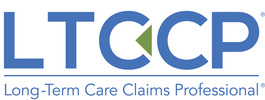|
Our mission is to educate long-term care providers and other professional advisors about how to work more effectively on behalf of clients with LTC insurance at the time of claim.
The goal of LTCCP® is to improve the quality and availability of long-term care services for clients who own LTC insurance by equipping the professionals who serve them with greater competency when managing and participating in the claim process. |
The LTCCP® curriculum is presented in 3 formats:
Successful completion of a web-based, proctored exam is required to use the LTCCP® designation.* |
COURSE OUTLINE
Insurance basics:
Helping providers and clients understand coverage:
History and development of LTC insurance over time:
Policy definitions:
When clients – or the agency can expect the first, and subsequent checks
Assignment of Benefits
Agency/provider eligibility
Plan of care
Understanding and working with Alternative Plan of Care language
Tax issues (basic understanding of taxability of benefit payments)
Alternative types of policies
Using LTC insurance expertise in marketing, new client intake, on-going care management and billing.
- Introduction to insurance
- Basic principles of insurance law with a focus on practical applicability at time of LTC claim
- Who has certain rights under the policy
- Who can call/talk to the insurance company and when
- HIPAA’s impact on LTC claims & communication
Helping providers and clients understand coverage:
- Understanding client biases about insurance and common misunderstandings
- Proactively helping clients understand their rights and responsibilities
- Strategies to learn more about the policy, more quickly
- Creating a positive environment to engage clients
- Systematic approach to engaging new clients with LTC insurance
- Gathering policy information
- Working with clients and/or family members who are reluctant to share policy details
- Working with families who are not ready to start a claim
- Setting claim responsibility and timing expectations with clients/family
- Establishing private-pay relationship/responsibility
History and development of LTC insurance over time:
- Examination of old, “problematic” policy provisions that may still be in-force
- How to manage claims with problematic provisions
- Regulatory changes and their impact on policy language and claims, now and in the future
- How insurance carriers manage different, diverse policy definitions within the same company
Policy definitions:
- Client eligibility:
- ADLs
- Hands-on vs. stand-by definition of loss
- Cognitive impairment
- Medical necessity
- Impact on charting and caregiver training
- Examples of good and bad practices
- Definitions pre & post-HIPAA
- Working with physicians or other providers who don’t understand what information is required
- Elimination period:
- Different ways to count EP days for home care
- Strategies to help clients through
- How to manage problematic definitions
- Using the EP and claims process to engage clients early
- Benefit amount:
- How to ID different benefits for different services
- Reimbursement vs. indemnity
- Ethical concerns
- Daily vs. weekly or monthly payments
- Benefit period:
- Time limited vs. pool of money
- Inflation increases:
- Types & how they work
- Automatic vs. purchase options
- How to calculate current benefit without calling the company
- Other benefits:
- Home modification
- Homemaker services
- Respite care
- Care coordination:
- Definitions
- Limitations
- Advantages
When clients – or the agency can expect the first, and subsequent checks
Assignment of Benefits
- Timing
- Good & bad practices
- The pitfalls of taking an AoB too early
- Fiduciary responsibility and liability in taking an AoB
Agency/provider eligibility
- How is “home care” defined
- Home health care vs. home care in LTC insurance
- What is an “agency”
- Is "assisted living/memory care" covered and how
- Examples:
- State licensure/non-licensure, policy definitions, and impact on provider approval
- Working with carriers when there is a denial of provider
- Managing client expectations
- Preserving client relationships
Plan of care
- Understanding what the insurance company wants and needs in a written plan of care
- How often and when to update
- What to include (or not)
- How the plan of care can cause claims problems
Understanding and working with Alternative Plan of Care language
- What is it
- How is it defined
- Limitations
- Opportunities
Tax issues (basic understanding of taxability of benefit payments)
- Referral/networking opportunity to accountants
Alternative types of policies
- Partnership LTC and Medicaid
- Linked-benefit or “hybrid” policies
- “Chronic care” policies and life insurance riders
- ADL definition changes
- Limited benefit plans
- Pre-paid home care contracts
Using LTC insurance expertise in marketing, new client intake, on-going care management and billing.
- Networking with insurance agents & other advisors
* The right to publicly use the LTCCP® designation in any form is subject to usage standards, guidelines, and ethical behavior as established by the certifying organization. Usage may be further limited by an employer, regulatory agency, or other supervisory relationship.

